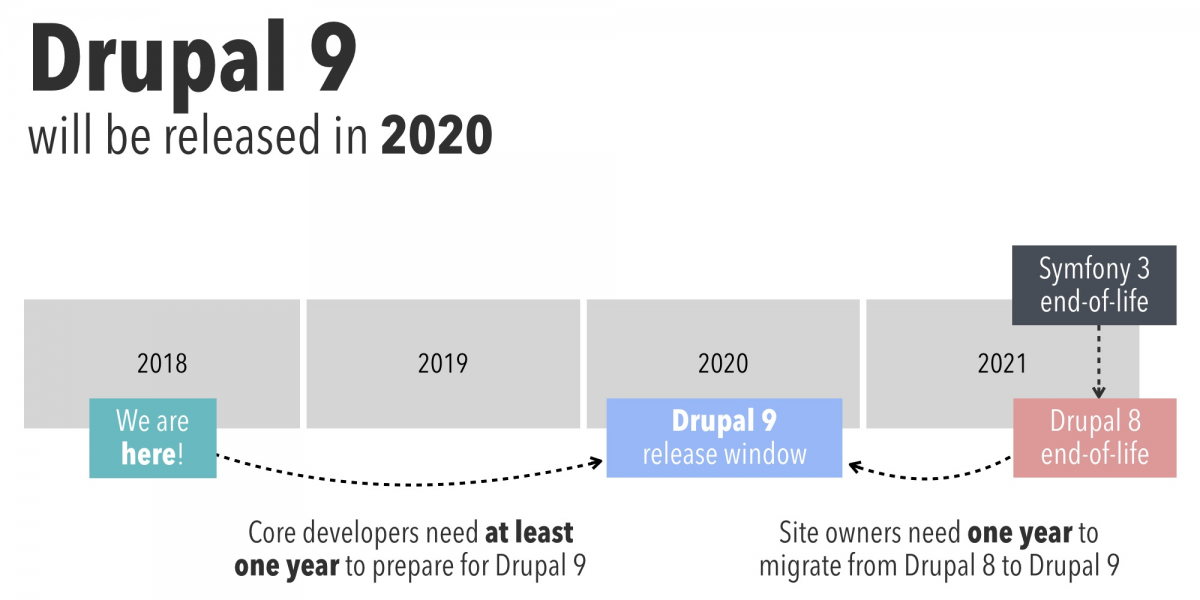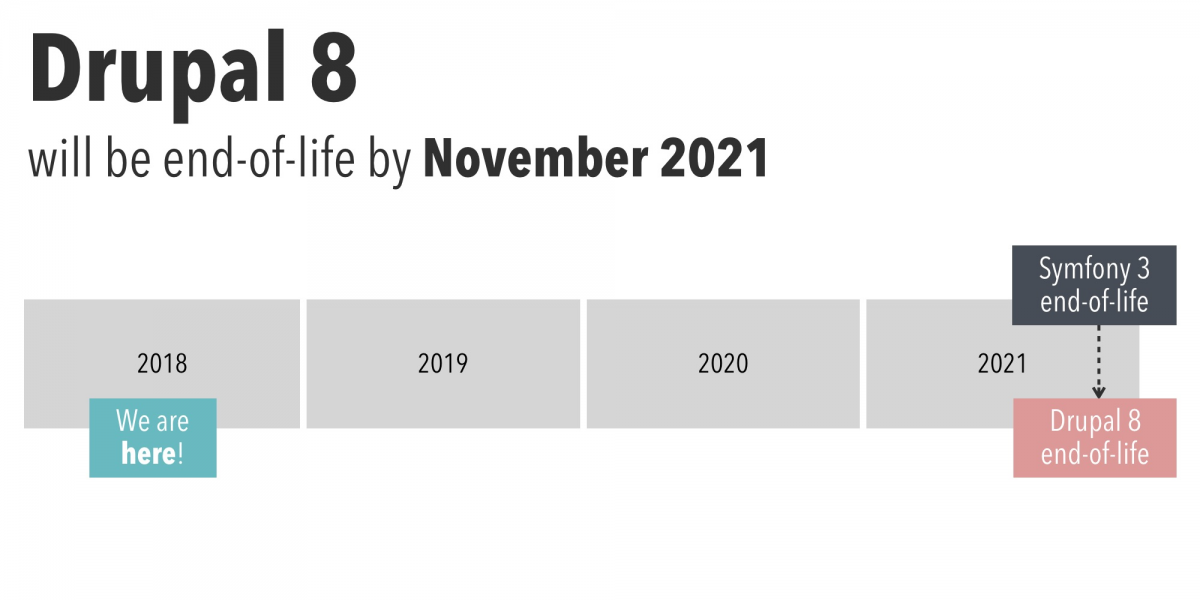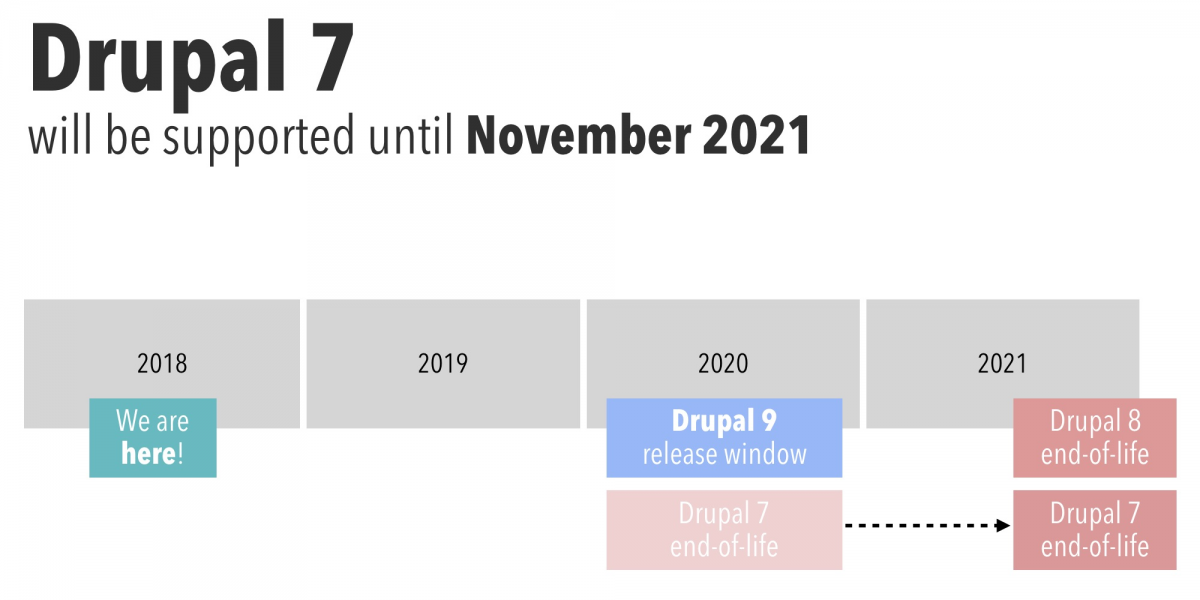
Upgrade Your Drupal Skills
We trained 1,000+ Drupal Developers over the last decade.
See Advanced Courses NAH, I know EnoughThe scheduled release of Drupal 9: what it means for Drupal 8 and 7
Every big Drupal release opens fantastic opportunities for websites. Three years ago, the eighth Drupal version came to this world — and the world fell in love with top-notch Drupal 8 improvements. Drupal 8 has been getting more and more awesome on its way from Drupal 8.1 to Drupal 8.5, and the latest version, Drupal 8.6, is cooler still. Drupal 8 is on its peak, but the cycles of development never stop. That’s why the Drupal community has already announced the expected release of Drupal 9 and end-of-life for Drupal 8 and 7. Let’s see what it means for Drupal 8 and 7 website owners and what action is needed from them. And, of course, our Drupal team is ready to help them take this action.
The planned release of Drupal 9 and end-of-life for Drupal 8 and 7
A little while after D8 was released, the most impatient and curious users began to ask questions about the future Drupal 9. When will it be released? What will it offer? Will websites need another upgrade?
Despite the fact that the development branch for Drupal 9 was started years ago, no one could know its release year for sure. There were even suggestions that Drupal 9 would never come at all — raised by a totally new approach to updates in Drupal 8 and the regular innovation mode.
However, the situation changed in September 2018, at the world-wide meetup for drupalers — Drupal Europe in Darmstadt. The “phantom” of Drupal 9 finally took shape. D9 will come, and the year is set! Drupal founder Dries Buytaert announced the Drupal community plans on it, as well as illustrated it with images:
- Drupal 9 release: 2020
- Drupal 8 end-of-life: 2021
- Drupal 7 end-of-life: 2021

End-of-life for Drupal versions: hey, what does it mean?
End-of-life, or EOL, is the moment when official support for a particular Drupal version drops. The Drupal team stops watching over it and creates no more updates and patches for it, including those in the security area. This means more vulnerabilities to hacker attacks and, of course, no new features.
For example, February 24, 2016, was the EOL for Drupal 6. The service of upgrades from Drupal 6 to Drupal 7 or 8 became a very popular one with our Drupal team, because many customers applied for that. By the way, if you are still using Drupal 6, it’s high time to upgrade — better late than never!
Usually the two latest Drupal versions are supported: the newly released and the previous one. However, in the case with D9, the EOL for D7 comes a little bit later and for D8 a little bit earlier than usual — in 2021 for both.
Although the end-of-life sounds a little scary, there is no need to worry. See the next chapters for more information.
What Drupal 9 release means for Drupal 8 websites

Drupal 8 is in the center of community’s ideas and is getting lucrative technological innovations all the time. Despite the EOL in 2021, the future looks particularly bright for D8 website owners. And here’s why.
Compared to Drupal 7, Drupal 8 is a technological breakthrough. That’s why upgrades from D7 to D8 are often lengthy (depending on the site complexity). But if you have moved to D8 from D7, that was your LAST cumbersome upgrade. No more of that from now on!
Drupal 8 websites will move to D9 quickly and smoothly. Lightning-fast upgrades will be provided for those that are using the latest Drupal 8 minor version and no deprecated APIs. This golden rule of keeping up-to-date and avoiding deprecated APIs helps even contributed and custom Drupal 8 modules be instantly compatible with Drupal 9! Our Drupal web studio is always ready to take care of this for you.
So an upgrade from D8 to D9 will be something you will barely notice. The secret is, according to the principle of continuous innovation, Drupal 8 releases backwards-compatible minor versions every half a year. Drupal 9 promises to be almost identical to the latest minor version of Drupal 8 with deprecated code removed, as stated in the article by Dries Buytaert “Making Drupal upgrades easy forever”.
What Drupal 9 release means for Drupal 7 websites

We wrote that the future looks bright for Drupal 8 website owners, but it also looks good for Drupal 7 website owners! They only need to take more decisive action. So what should they do considering the dropping of support in 2021?
- They might hope for a commercial support program for Drupal 7 that the community is thinking to implement, but relying on it looks like staying with the past.
- They might also wait for Drupal 9 and jump directly to it. But they will need a big upgrade someday anyway — to Drupal 8 or 9, which are very close relatives. The time passes, and all this time they could be enjoying Drupal 8 without putting their success on the shelf.
- The best option is to move to Drupal 8 in the nearest future. Just one upgrade will be their ticket to the future hassle-free upgrades (to Drupal 9, 10, and beyond). And, of course, they will be in line with the times and have all the Drupal 8 innovations. Our migration experts are ready to smoothly move you to Drupal 8.
So there’s no need for a fortune-teller to predict your future in relation to the release of Drupal 9 ;) The future looks bright for you in any case! The only condition is that have good drupalers on hand.
Drupal updates and upgrades, as well as Drupal support are among our areas of expertise.
Contact our Drupal team, and let’s choose the best action for your website!
About Drupal Sun
Drupal Sun is an Evolving Web project. It allows you to:
- Do full-text search on all the articles in Drupal Planet (thanks to Apache Solr)
- Facet based on tags, author, or feed
- Flip through articles quickly (with j/k or arrow keys) to find what you're interested in
- View the entire article text inline, or in the context of the site where it was created
See the blog post at Evolving Web

